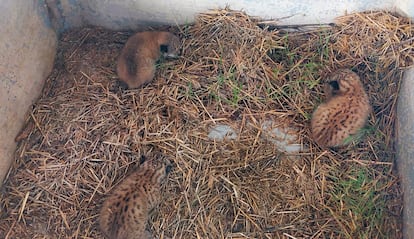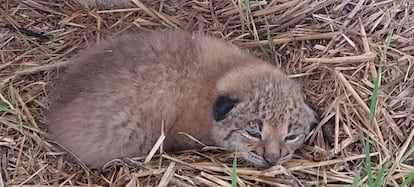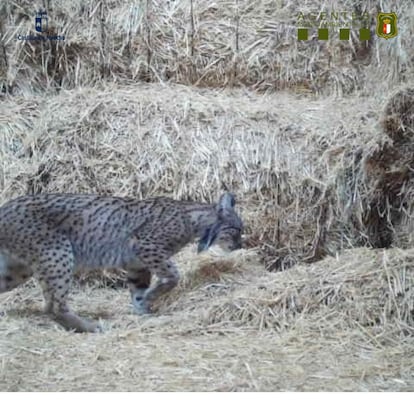A rancher finds three newborn lynxes in his haystack in Spain
Births of this type are not frequent, although there are several cases of females choosing buildings to shelter and give birth

A cattle rancher from Menasalbas, a village in the Spanish province of Toledo, came across three newborn lynxes on Saturday in one of the buildings where he keeps bales of straw. The tiny cubs were all alone and sleeping peacefully. “At first he thought they were cats, but they seemed different and he called [the emergency services] 112,” explains Alfonso Sánchez, coordinator of the environmental agency of the Spanish region of Castilla-La Mancha. The rancher only keeps his reserve straw in there and does not use the building regularly, which afforded the mother lynx a quiet refuge in which to give birth.
Environmental officers were dispatched to the ranch, where they verified that the cubs were lying on a bed of straw. They installed camera traps and observed how the mother fed them for a day and a half. On Monday, the mother decided to move the three cubs to a different location. The female is a free-born specimen and is not equipped with any tracking device to help locate her.
In 2002, the Iberian lynx (Lynx pardinus) was in a critical situation, with only 94 animals located in the southern Spanish region of Andalusia. But thanks to captive breeding programs and the creation of different nuclei, the population has increased more than tenfold in two decades. In 2020, the species’ numbers in Spain and Portugal passed the 1,000-mark, with the population reaching 1,111, including both adults and cubs.

These days, events like the one reported in Toledo are becoming increasingly common in Spain, where in 2015 the Iberian lynx came out of the “critical danger of extinction” category. In the region of Castilla-La Mancha, lynxes already have three consolidated zones located in mountain ranges: the Montes de Toledo, the eastern Sierra Morena and the western Sierra Morena. Currently, another group is forming in the province of Albacete, where seven specimens are already living following the release of four individuals in February.
Each female lynx uses between 500 and 1,000 hectares of space, depending on the number of rabbits, which are vital to the wild cat’s diet. The number of cubs in each litter also depends on food availability. The average breeding female lynx gives birth to 1.7 cubs, but this number varies depending on where they live: in Andújar and Doñana National Park, where there are few rabbits, females give birth between one and two cubs, while in the Montes de Toledo mountain range, the average is between three and four.

Last year, another female lynx decided to use a box she found in a farmhouse in Spain’s western Badajoz province to give birth. The owner of the property found four tiny cubs on a shelf at the back of a warehouse attached to his home where he stored random items. Lynxes most typically take advantage of hollow trunks or holes in rocky areas to give birth, experts say.
Sign up for our weekly newsletter to get more English-language news coverage from EL PAÍS USA Edition
Tu suscripción se está usando en otro dispositivo
¿Quieres añadir otro usuario a tu suscripción?
Si continúas leyendo en este dispositivo, no se podrá leer en el otro.
FlechaTu suscripción se está usando en otro dispositivo y solo puedes acceder a EL PAÍS desde un dispositivo a la vez.
Si quieres compartir tu cuenta, cambia tu suscripción a la modalidad Premium, así podrás añadir otro usuario. Cada uno accederá con su propia cuenta de email, lo que os permitirá personalizar vuestra experiencia en EL PAÍS.
¿Tienes una suscripción de empresa? Accede aquí para contratar más cuentas.
En el caso de no saber quién está usando tu cuenta, te recomendamos cambiar tu contraseña aquí.
Si decides continuar compartiendo tu cuenta, este mensaje se mostrará en tu dispositivo y en el de la otra persona que está usando tu cuenta de forma indefinida, afectando a tu experiencia de lectura. Puedes consultar aquí los términos y condiciones de la suscripción digital.









































